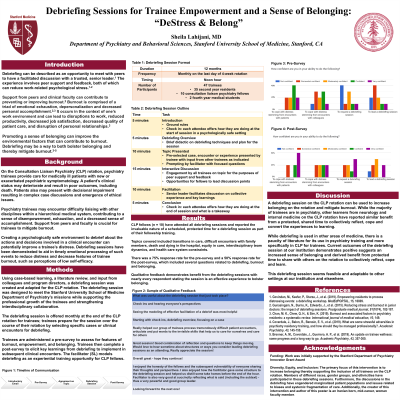Training, Education, Mentorship, and Career Development
(196) Debriefing Sessions for Trainee Empowerment and a Sense of Belonging (“DeStress & Belong”)


Sheila Lahijani, MD, FACLP
Associate Clinical Professor
Stanford University School of Medicine
Palo Alto, California
Presenting Author(s)
Background/Significance: On the Consultation Liaison Psychiatry (CLP) rotation, psychiatry trainees provide care for medically ill patients with new or exacerbated psychiatric symptomatology. A patient’s clinical status may deteriorate and result in poor outcomes, including death. Patients also may present with decisional impairment resulting in complex case discussions and emergence of ethical issues. Psychiatry trainees may encounter difficulty liaising with other disciplines within a hierarchical medical system, contributing to a sense of disempowerment, exhaustion, and a decreased sense of accomplishment. Support from peers and faculty is crucial for trainees to mitigate burnout. Creating a psychologically safe environment to debrief about the actions and decisions involved in a clinical encounter can potentially improve a trainee’s distress. Debriefing sessions have been demonstrated to aid in timely emotional processing of such events to reduce distress and decrease features of trainee burnout, such as perceptions of low self-efficacy.
Methods: Using case-based learning, a literature review, input from colleagues and program directors, a debriefing session was created and adapted for the CLP rotation. The debriefing session was designed to meet the Department of Psychiatry’s missions while supporting the professional growth of the trainees and strengthening interdisciplinary collaboration. The debriefing session is offered monthly at the end of the CLP rotation for trainees; trainees prepare for the session over the course of their rotation by selecting specific cases or clinical encounters for debriefing. Trainees are administered a pre-survey to assess for features of burnout, empowerment, and belonging. Trainees then complete a post-survey to elicit key learnings from debriefing to implement in subsequent clinical encounters. The debriefing facilitator (SL) provides experiential training to CLP fellows to facilitate debriefing sessions.
Results: Debriefing sessions are ongoing, and data continues to be received. From qualitative feedback and current pre/post surveys there is notable benefit derived from the debriefing sessions with nearly every respondent stating the session improves sense of belonging on the CLP rotation and is an effective experience to bolster belonging. CLP fellows have attended all debriefing sessions and reported the invaluable nature of a scheduled, protected time for a debriefing session as part of their fellowship training.
Discussion: A debriefing session on the CLP rotation can be used to increase belonging on the rotation and mitigate burnout. While the majority of trainees are in psychiatry, other learners from neurology and internal medicine on the CLP rotation have reported similar benefit from a protected, shared time to collectively reflect, cope and convert the experiences to learning.
Conclusion/Implications: While debriefing is used in other areas of medicine, there is a paucity of literature for its use in psychiatry training and more specifically in CLP for trainees. Current outcomes of the debriefing session at our institution demonstrates positive feedback and survey results from trainees, suggesting a greater sense of belonging and derived benefit from protected time to share with others on the rotation to collectively reflect, cope and learn. This debriefing session seems feasible and adaptable to other settings at our institution and elsewhere.
References: https://www.ncbi.nlm.nih.gov/pubmed/25755266
https://www.mededportal.org/publication/10809/
https://link.springer.com/article/10.1007/s40596-019-01082-2
https://www.ijme.net/archive/10/burnout-in-psychiatry-residents.pdf
https://link.springer.com/article/10.1007/s40596-019-01026-w
Presentation Eligibility: Not previously published or presented
Work was initially supported by the Stanford Department of Psychiatry Innovator Grant Award & thus this will be denoted on the poster if accepted
Diversity, Equity, and Inclusion: The primary focus of this intervention is to increase belonging thereby supporting the inclusion of all trainees on the CLP rotation. Members of different races, gender groups, and ethnicities have participated in these debriefing sessions. Furthermore, the discussions in the debriefing have engendered marginalized patient populations and issues related to biases and systemic fragmentation of care. Additionally, the creator of this intervention and author of this poster is an Iranian born, mid-career, woman faculty member.

